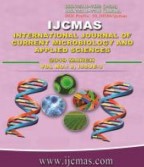


 National Academy of Agricultural Sciences (NAAS)
National Academy of Agricultural Sciences (NAAS)

|
PRINT ISSN : 2319-7692
Online ISSN : 2319-7706 Issues : 12 per year Publisher : Excellent Publishers Email : editorijcmas@gmail.com / submit@ijcmas.com Editor-in-chief: Dr.M.Prakash Index Copernicus ICV 2018: 95.39 NAAS RATING 2020: 5.38 |
India is an agrarian economy where around 50 percent of their population is employed through this sector and to the contrary agriculture and allied sectors contributes only 16.4 per cent in 2017-18 to the Indian GDP. Rice is one of the three most imperative food crops in the India. The study was done during the agricultural year of 2016-2017 to analyze the differences in Return on Investment (ROI); when farmers own the land and when it is rented. Haryana is divided into 3 zones and from each zones one district was randomly selected. 60 paddy growers from each of the 3 districts of Haryana were selected randomly pooling which made an initial sample size of 180. But not all paddy cultivators were basmati grower and so 37 from Karnal, 22 from Rohtak and 9 from Rewari were the scented paddy grower and thus making the actual respondents size of 68. The study concludes that cultivation of scented rice is only plausibly profitable when the farmer own the land. It was also visible that as high as 35.80 percent of the total cost is spent by the farmer in renting the land. The ROI when land is rented is 7.89 percent; while when it is owned is 68.04 percent.
 |
 |
 |
 |
 |